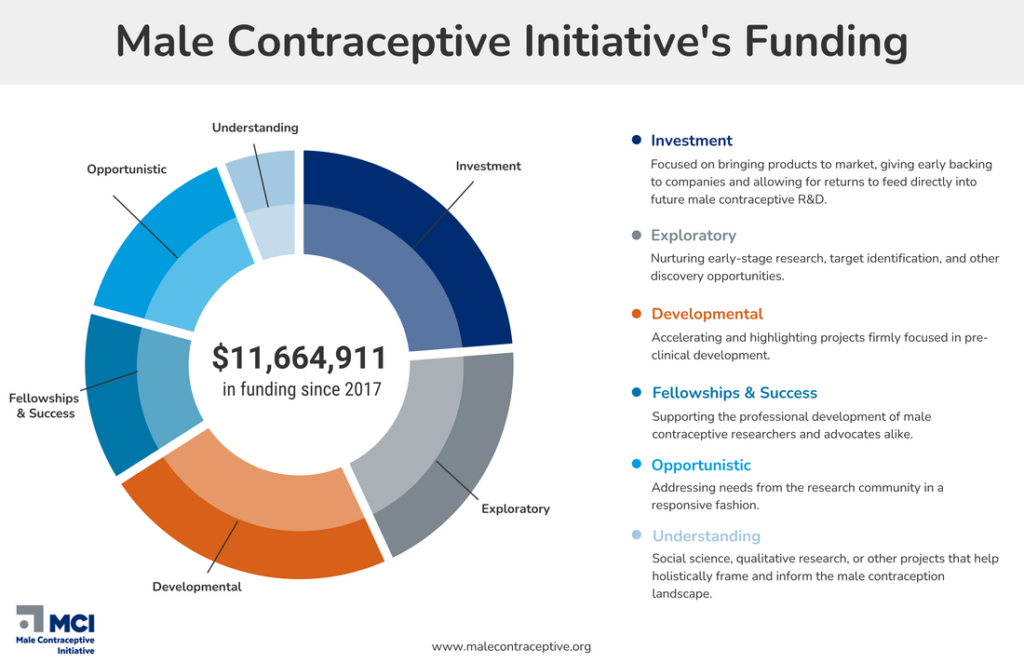The Male Contraceptive Initiative celebrates its 10-year anniversary this year! The U.S.-based nonprofit organization is a leading funder and advocate for male contraception. Their stated goal is “Reproductive Autonomy for All.”
Historical perspectives on male contraceptive advocacy
It is a great time to reflect on advocacy, education, and funding efforts for new male contraceptive development. Before founding the Parsemus Foundation, Elaine Lissner was focused on male contraception. As a student at Stanford, she was struck by the lack of development of low-tech birth control methods — and by the side effects of hormonal birth control among her friends. She wrote several popular articles on the topic, including a 1992 piece in Ms. that resulted in over 200 letters asking for more information.
That’s when Elaine realized that people really care about this issue. So she started the nonprofit Male Contraception Information Project to increase awareness about nonhormonal male contraception and convey the public’s demand to policymakers. Elaine directed the organization until 2013, when she passed the baton and provided the first funding to the newly-formed Male Contraception Initiative (MCI).
MCI hired its first director, Aaron Hamlin, in 2014. Over the years, funding was secured to provide grants to male contraceptive research, and additional staff members were added, including Logan Nickels, Ph.D., who oversees programs and operations. In 2018, Heather Vahdat became the executive director, and over the next few years, the program and impact expanded.
We can’t mark the exciting occasion of MCI’s 10th anniversary without acknowledging our friends and colleagues at the Parsemus Foundation. It was their initial investment, and the years of advocacy and support for the field of nonhormonal male contraception that preceded it, that brought MCI to life. Elaine and her team kept the promise of male contraception alive when no one else was paying attention. We will always owe them a tremendous debt of gratitude. Heather Vahdat, Executive Director, MCI
Male Contraceptive Initiative programs and accomplishments
MCI’s mission is to empower men, and couples, to fully contribute to family planning goals by providing them the resources they need for reproductive autonomy.
The nonprofit has diverse initiatives to reach these goals. Of significance are the research grants provided to advance the science of nonhormonal male contraception. MCI has directly funded research and development of new non-hormonal, reversible male contraceptives. This includes projects at various stages of development and focus.
MCI’s grants stand out as one of the few funding sources for new male contraceptive development, even though the public demand is clear, and women trust their male partners to take contraception. MCI works to bridge the gap between funding and demand by focusing on advocacy. This involves research and publication of surveys on attitudes about male contraception as well as the impacts that new male contraception can have on society. MCI also offers many ways to engage and educate the public about male contraception. In addition to their info-packed, award-winning website, the nonprofit also offers videos, webinars, infographics, blogs, podcasts, and events.
MCI has a for-profit subsidiary called the Contraceptive Accelerator Network (CAN) to help ensure that promising non-hormonal, reversible contraceptive targets receive the support necessary to reach the marketplace as next-generation birth control methods. They launched the Non-hormonal, Reversible Male Contraception Target Database to keep track of the many potential male contraceptives and their status.
MCI has also made efforts to help the next generation of students and scientists in male contraception. Programs include Fellowships, a Youth Advisory Board, and an undergraduate grants program (which the Parsemus Foundation is proud to support).
What you can do to ensure a future of reproductive autonomy for all
The importance of male contraception is greater now than ever before. If you weren’t familiar with MCI before, we hope you’ll visit their website where you can find all the information you need on the current status of new, nonhormonal male contraceptives. Please consider getting involved as a volunteer, student ambassador, scientific colleague, grantee, or donor.




